1971 NADA Land Rover Series 2a 88 Wheelbase Soft-top
- Price:
- Make: Land Rover
- Model: Series 2a
- SubModel: 2a
- Type: U/K
- Trim: Soft-top
- Year: 1971
- Mileage: 124
- VIN: 24442425
- Color: Green
- Engine size: 2.25 Petrol
- Number of cylinders: 4
- Fuel: Gasoline
- Transmission: Manual
- Drive type: Left Hand Drive
- Interior color: Black
- Drive side: Left-hand drive
- Options: 4-Wheel Drive
- Vehicle Title: Clear
- Location: Jupiter, Florida, United States
Description
LAND ROVER: 1971 NADA Series 2a / 88-inch Wheelbase / Left-hand Drive
SELLER’S NOTE: I’m the second owner of this truck and I’ve maintained it fairly well. You’d be surprised how many people come up to me and say: “Wow. Nice restoration.” But please be aware that this is NOT a restored vehicle in any sense of the word. To review the cost of a professionally restored Series Rover (50k plus), you might consider visiting the website of North American Overland. And don’t forget to check out all of the relevant YouTube videos you can. You’ll then get an idea of why some of us are born convinced that we have to own at least one of these cumbersome machines during our lifetime. Oh…and if you think the word cumbersome is inappropriate here…go test-drive a Series truck near you and you’ll see what I mean. These were designed to perform as agricultural vehicles. Every Series owner will tell you that they handle like primitive tractors – both on and off the road.
A LITTLE PHILOSOPHY: In the Spring 2017 issue of “Rovers Magazine” (by parts supplier, Rovers North) writer and photographer Matt Rigby sums up what owning a vintage Series vehicle really means. In his article describing his own 1966 Series 2a, Matt reminds us that we never truly “own” a particular Series truck; rather, we’re merely serving as its steward. Of course, there are many vehicles on this earth that are worthy of preservation. These legendary off-road trucks just happen to rank very high on that list.
SOME HISTORY TOO: The Series 2a is the last model equipped with the more desirable All-Metal Dash. The production vehicle following the 2a (introduced in late 1971) is called the Series 3 and it incorporates a Molded Plastic Dash. There are other differences between the models too – the most obvious being the somewhat flat door hinges used on the Series 3, as well as their plastic (vs. metal) radiator grills. In some areas of the world, the earlier metal grills are often used over campfires to Bar-BQ. I’ve been told that even today some Series 3 owners replace their plastic grills with the heartier metal versions to take advantage of this additional back-roads functionality.
SPECIAL DELIVERY: This particular Series 2a configuration (being offered here) was designated as the “Federal 88 Model” by the factory as it was created expressly for import into North America. That is to say, it was not only assembled as a Left-hand Drive unit for the American market, but it was also equipped with three mandated emission control systems. It included the following USA-compliant features: (1) A fuel-tank-fumes collection canister; (2) A crankcase ventilation system, which routes crankcase fumes into the combustion chamber via the air intake hose; and (3) A Zenith 36-IVe carburetor with shut-off solenoid to reduce engine run-on. These features are still in operation, with the exception of the Zenith carb. I’m running a Weber 34-ICH carb right now, but the original Zenith – rebuilt by me and working fine – is included in the sale. Speaking of imported trucks, according to the author J. Taylor (“Land Rover: 60 Years of the 4x4 Workhorse”) between 1948 and 1974 only 13,500 Land Rovers reached the USA.
A QUICK OVERVIEW: This is currently my Daily Driver so it’s been getting me back and forth to work for many years now – and to local dog parks with my hairiest family members riding in the back. Our latest rescue, Jelly Bean, is shown in the photos. I actually purchased this truck from an Englishman named Paul (believe it or not) who resided in Pompano Beach, a town just south of Jupiter. Paul learned to drive in a Series truck in England when he was a young lad. He was a private dealer in Pompano who found homes for pre-owned Defenders. He just happened to have this lonely Series 2a in his collection years ago. I eagerly inspected it and then quickly procured this truck after posing only one question to Paul: “Is this for sale too?” Long story short: I didn’t care if it ran or not. I fell in love with this green thing at first sight. It was running on the day that I bought it, sure, but it was definitely not safe to drive in traffic. It turns out that the carburetor had never been routinely cleaned and therefore wasn’t performing properly. And the brake drums must have been worn beyond factory specs: they were not functioning well either. In short, this truck cried out for some attention. So I bought it. And had it towed home as soon as possible so I could start working on it right away. (That behavior will only make sense to a limited number of readers, and the majority of those will be mechanics.)
PROPER MAINTENANCE IS KEY: I still use our most popular sources for parts, from here in the USA and from abroad: Rovers North, Paddocks, Rovah Farm, Atlantic British, Rimmer Bros., and Pangolin 4x4, just to name a few. And I have most (if not all) of my receipts for the work that I’ve completed over the years. (Yes, I’m the mechanic.) Here’s an edited list of specifications to date that should be of interest to any Series shopper:
OEM WARN M-11 LOCKING FRONT HUBS (I think these were factory-installed?)
ROAMERDRIVE (by Rocky Mountain)
PARABOLIC SPRINGS (by Rocky Mountain)
EXMOOR DELUXE SEATS
HI-TORQUE STARTER (no more slamming of gears by the old starter)
WEBER 34-ICH CARBURETOR (plus the original and rare Zenith 36-IVe)
SMITHS CLOCK & GAUGES (mechanical OP gauge installed – have an electrical too, if preferred)
MICHELIN 7.50Rx16 MILITARY TIRES (worn down, but still loud and very obnoxious!)
OEM 2.25 LITRE PETROL ENGINE (with 8:1 heads, which are clearly marked as such)
OEM 2A TRANNY (the most durable tranny - synchronized in 3rd and 4th gears only)
NEW SPEEDO WITH TRIP METER (geared for its 16-inch wheels. Have the original speedo too)
NEW BRAKES (and associated parts: hubs, shoes, cylinders, springs, flex hoses, etc.)
NEW CLUTCH PLATE & COVER (inspired by many years of clutch judder!)
NEW VALVE STEM RUBBER SEALS (I personally lapped the valves and seats too)
NEW RADIATOR (number 3)
NEW WATER PUMP
NEW MECHANICAL FUEL PUMP (I actually have 2 pumps – one is a back-up)
NEW SWIVAL BALL SEALS (JB Weld was used to patch small pin holes in the Balls)
NEW REAR DRIVE SHAFT (the original had a slight amount of side-play)
NEW REAR OUTPUT OIL SEAL (installed when I had the tranny out)
OEM REBUILT REAR DIFFERENTIAL (from England)
OEM REBUILT GENERATOR (just say NO to modern alternators!)
THREE BOTTLE OPENERS (very important: two on back, one on front bumper. See photos)
And of course, there’s more – including lots of stainless steel fasteners too, inside and out.
THE NOT-SO-PERFECT: For “comparison-shopping” purposes, you need to know two things about this truck: 1) It has its original STEEL frame, and the frame does have some surface rust and even a few rust-through areas, primarily on the rear cross member (a replaceable part) which is now covered with an alloy diamond-patterned-plate that I painted black. (See photos). The frame remains structurally sound and I believe it’s good for another 50+ years; and 2) The original galvanized body parts (the trim parts) were painted over by the first owner with body-color – similar to the later Defender models. I painted them silver soon after I purchased the truck to retain the proper color break for Series trucks. I had no intention of ever restoring or replacing any of its galvanized parts. In my opinion, it would not have been cost effective.
THE GOOD-TO-GO: For what it’s worth, this truck (to my surprise) won “Best In Land Rover Class” several times in our yearly “Wheels Across The Pond” British Car Show here in Jupiter. And it’s received various other recognitions in local car shows over the years. But when I bought the truck, I had no intention of ever placing it in a car show. It was only when I noticed that Series trucks were missing from the local shows that I was impelled to display it. My decision prompted several more Series owners to participate in subsequent years, which added to the fun, especially for Rover enthusiasts. Interesting lesson about entering your Series Rover in a car show: Far less maintained trucks often received more votes from the public than mine. Conclusion: A multi-colored, dented, and rusted collection of bolts often proves to be more entertaining!
A WORD OF CAUTION: Hopefully you can see from the photos that this is far from being a perfect Series 2a Land Rover. Look closely at the photos. The paint has a few cracks here and there; and there are some small dings in the body, especially in the tub. It displays at least 3 different (albeit subtle) shades of green paint too, all the more visible depending on the lighting and your point of view. The reason: Touch-up paint rarely matches aging OEM paint. But mechanically speaking, it still performs exactly as it was intended to perform. And it’s proven to be very dependable for me – but only if you maintain it like I have over the years. Remember: We’re not here to own them. We’re here only to maintain them – and then gracefully hand them over to the next steward waiting in line. And don’t think for a moment that you’re not going to have to tinker with any unrestored Series Rover on a regular basis. This is a 46-year-old (and aging) vehicle. But still, I wouldn’t hesitate to drive this truck anywhere and for any distance. I would definitely bring my toolbox with me though, and a cell phone too, just in case. And maybe some earplugs might be useful. Those mud tires are loud! Whaaaat?
LOOK BEFORE YOU LEAP: I encourage all prospective buyers to test-drive any Series Rover that you plan to bid on, or purchase – and that includes this handsome truck – regardless of your first impression. And drive the candidate around for about 20 miles or more. And then inspect the vehicle when you stop – if the brakes are working, that is. Next, look around to see what parts have dropped off, so you can determine how much the missing parts are going to cost you. But it’s important you do this BEFORE you buy it. Unless you’re like me…and you fall in love with any mechanical thing that looks like it deserves preservation. Yep. That’s me in a nutshell – bloody knuckles and all.
HEADS UP: A message to those who might consider adopting any 4x4 legend, especially an eye-catching Series truck. Predictably, the crowds will gather at the first sight of it. And the questions will never cease. Unfamiliar men, women, and children will wave at you with enthusiasm, pretending they personally know you. Many of them won’t hesitate to ask, “Is it for sale?” And all breeds of dogs, large and small, will attempt to befriend you, and bark at you as if to say, “Hey handsome! I could use a lift!” Even Jeep owners will stare at these Series trucks in a state of wonderment and shared delight. In short, be prepared. If you plan to drive one, then plan on meeting your extended family. You’ll soon discover that you have a lot more in common with complete strangers than you ever imagined.
TERMS: As you can expect, this is an “AS-IS” offering. The first $500 deposit will hold this truck for a reasonably prompt inspection. I’m in no hurry to sell it, but I do insist the buyer inspect the vehicle before the purchase is finalized. Pay special attention to a Series truck’s complete underside, and other parts that are not shown in the photos. I want the buyer to be as happy with this truck as I have been. The balance will be due within 7 days of the deposit. The title will be transferred to the “new steward” only after the agreed purchase funds have cleared my…uh…my lovely wife’s bank. Just to be clear, I do believe this vehicle can be safely driven to your home after purchasing it. Again, the downside of driving it on the road is the incredibly loud noise generated by those Michelin mud tires – even at low speeds. Note: The farthest I’ve driven it in one day is about 120 (or so) local miles on local side roads. Never on an interstate highway! In the meantime, here’s something else you might want to think about:
“If you’ve waited this long to own a Series Land Rover, you’ve waited long enough.”
 1959 Land Rover 109 series 2 NADA LHD
1959 Land Rover 109 series 2 NADA LHD
Mileage: 77,000
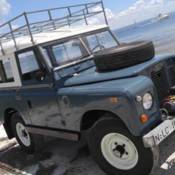 1969 NADA Land Rover Series 2a pre Defender
1969 NADA Land Rover Series 2a pre Defender
Mileage: 16,343
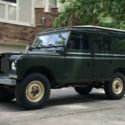 Land Rover 109 Series IIA NADA 6-cylinder Station Wagon
Land Rover 109 Series IIA NADA 6-cylinder Station Wagon
Mileage: 22245
 1970 Land Rover series IIa 88 wheelbase
1970 Land Rover series IIa 88 wheelbase
Mileage: 5554
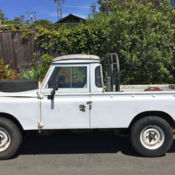 Land Rover Series III Pickup 109" Wheelbase
Land Rover Series III Pickup 109" Wheelbase
Mileage: 50
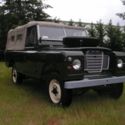 1980 Land Rover Series III FFR 109 Long Wheelbase
1980 Land Rover Series III FFR 109 Long Wheelbase
Mileage: 76,279
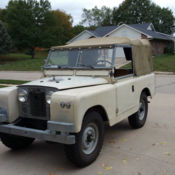 1966 land rover series iia 88-inch wheelbase
1966 land rover series iia 88-inch wheelbase
Mileage: 71,170
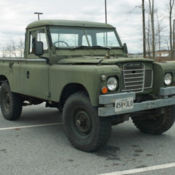 Land Rover Series III Pickup Military FFR 109" Wheelbase
Land Rover Series III Pickup Military FFR 109" Wheelbase
Mileage: 74,500
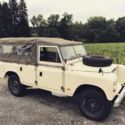 Land Rover 109 Series III Station Soft Top
Land Rover 109 Series III Station Soft Top
Mileage: 50,000
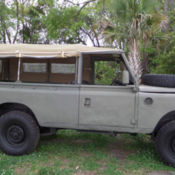 1984 LAND ROVER 109 SERIES 3 EX MILITARY 3/4 TON SOFT TOP 4X4 LHD OTHER
1984 LAND ROVER 109 SERIES 3 EX MILITARY 3/4 TON SOFT TOP 4X4 LHD OTHER
Mileage: 28,000












